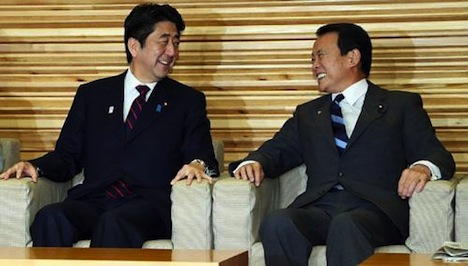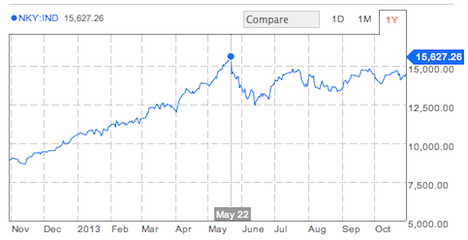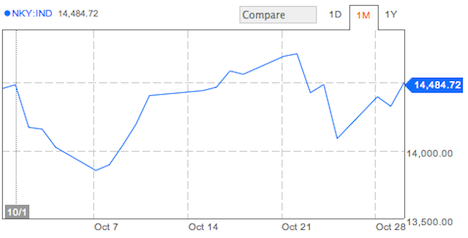Earlier this month, Japanese prime minister Shinzō Abe (安倍 晋三) moved forward with plans to increase the top rate of Japan’s consumption tax from 5% to 8%, effective as of April 2014 — and he is expected to allow the rate to rise further to 10% in autumn 2015. ![]()
It was the first major policy decision since Abe led his party, the long-dominant Liberal Democratic Party of Japan (LDP, or 自由民主党, Jiyū-Minshutō) to a landslide victory in the July vote that elected one-half of the seats (121) in the House of Councillors, the upper house of Japan’s parliament, the Diet (国会). That vote was essentially a referendum on Abe’s big-spending economic stimulus program — widely called ‘Abenomics’ — following Abe’s equally impressive victory in December 2012 in the elections for the House of Representatives, the Diet’s lower house.
It’s notable for three reasons.
Abe’s control over the LDP is firm
First, it demonstrates just how much control Abe has amassed as prime minister over the various factions within the LDP, which function almost like mini-parties within the LDP. The factions range from nationalist to dovish to reformist to economically liberal to economically activist. It’s one thing for Abe to enact massive fiscal stimulus in the weeks following his election late last year, it’s quite another thing to enact a tax increase. That Abe decided to push forward with the consumption tax rise shows just how much unity he’s developed within the LDP. In an era when the tenure of Japanese prime ministers is about one year, Abe seems to be consolidating his grip on power, not losing it — notwithstanding the growing anti-nuclear rumblings of former LDP prime minister Junichiro Koizumi (小泉 純一郎).
In his first months in office, Abe enacted ¥10.3 trillion ($116 billion) in additional spending to stimulate Japan’s economy, and he has successfully pushed for looser monetary policy from the Bank of Japan, including a massive quantitative easing program and an explicit inflation target of 2% inflation under the BoJ’s new governor, Harhuiko Kuroda (黒田 東彦). Aside from the immediate ‘Keynesian’ impact of the fiscal stimulus in boosting demand, Abenomics has lowered the value of the Japanese yen, thereby making Japanese exports more competitive globally.
If implementing fiscal stimulus (the ‘first arrow’ of Abenomics) and looser monetary policy (the ‘second arrow’) were relatively simple, Abe must still conjure the political will to pass structural reforms to Japan’s labor market and tax system (the ‘third arrow’) — those would include introducing competition within health care and other sectors, easing rules on hiring and firing workers, and reducing Japan’s corporate tax rate of 38%, one of the world’s highest. Serious reforms could boost Japan’s long-term economic prospects by introducing more efficiency and making Japan more attractive to investment.
But both the government that introduced the consumption tax in 1989 and the government that raised its rate from 3% to 5% in 1997 suffered political defeats soon thereafter when the tax negatively impacted Japan’s economy — the fall of former prime minister Ryutaro Hashimoto (橋本 龍太郎) can be directly traced to the unpopularity of the tax increase and the 1997 recession. So the LDP’s factions realize how politically challenging the consumption tax increase will be. If they are willing to follow Abe’s lead on the consumption tax, they may be willing to follow his lead on reforms as well.
Consumption tax hike is DPJ’s chief policy legacy
Second, the tax hike the centerpiece of the previous government of the Democratic Party of Japan (DPJ, or 民主党, Minshutō), which controlled Japan’s House of Representatives between 2009 and 2012. Raising the consumption tax was the key policy priority of former prime minister Naoto Kan (菅 直人), and when Yoshihiko Noda (野田 佳彦) took over in 2011 as prime minister, he made it his priority as well. His last major act as prime minister of an incredibly unpopular DPJ government was to secure the passage of the consumption tax increase before the country headed to snap elections last December.
If the consumption tax rate succeeds in shoring up Japan’s finances, it could become the greatest legacy of the short-lived DPJ government. Though the consumption tax was one of the reasons that the DPJ and its three prime ministers became so unpopular, it will have validated both the judgment of the Japanese electorate in 2009 by giving the DPJ a chance to govern (the LDP had previously governed nearly without interruption since 1955), and it will have justified the massive losses that the DPJ suffered in the December 2012 elections.
Timing is crucial
Finally, the most crucial points is the timing of the tax increase. The move contradicts the wave of spending that’s marked much of the first 10 months of Abe’s premiership. Abe and his advisers, including finance minister Tarō Asō (麻生 太郎) (pictured above, right, with Abe), obviously believe that the steps Abe has taken to boost Japan’s economy are working well enough to withstand the effects of a sales tax increase on consumer demand — the tax increase could cost consumers up to ¥8 trillion from consumers’ pockets annually.
On the basis of the first two quarters of 2013 economic data, Japan will grow by around 4% this year, which marks the highest GDP growth since 1990, except for a minor post-crisis blip in 2010. (In 2010, the economy grew by 4.7%, bouncing back from a 5.5% contraction in 2009 following the global financial crisis. Japan actually contracted further in 2011 by 1.6% before achieving mediocre 2% growth in 2012).
If that rate holds for 2013 and through 2014 and perhaps beyond, it will firmly push Japan out of its low-growth, deflationary, decades-long funk, and it’s already pushed the Nikkei, Japan’s stock market, to leap nearly 75% between November of last year (anticipating Abe’s election) through spring 2013:
There are strong reasons for moving forward with the consumption tax increase so soon after implementing such aggressive stimulative policies, however, not least of which is Japan’s massive public debt, the world’s largest at around 220% of GDP. Though much of that debt is held internally by Japanese citizens, who are among the world’s most inclined toward savings, the debt level remains a massive weakness in Japan’s future finances, especially considering Japan’s demographic challenges — its population fell by 212,000 people last year, its birth rate continues to fall, 40% of its current population is already over age 65, and Japan’s Ministry of Internal Affairs projects that its current population of around 127 million could fall to below 98 million by the year 2050.
But raising the sales tax could stifle domestic demand just when the economy is taking steam after years of false starts — though economists debate the role of the 1997 rate hike in the 1997 recession (the greater Asian currency crisis may have played the larger role), if the timing is wrong, Abe’s popularity will sink and Japan will have lost its best chance in two decades to turn around its low-growth economy. The stakes are incredibly high.
So far, despite a moderately sharp drop in the Nikkei in the days following the October 1 tax announcement, markets are reacting calmly:
Much of the revenue from the tax increase will be dedicated to further fiscal stimulus. To that end, Abe simultaneously announced further stimulus measures of around ¥5 trillion ($51 billion) that include cash handouts to low-income families and tax breaks of up to ¥1 trillion for companies that increase wages and make additional capital investments. Moreover, with Kuroda firmly in control of the Bank of Japan through the next five years, Abe can count on even greater monetary easing in the event that the consumption tax takes too much wind out of the Japanese economic recovery.
We won’t know the impact until next summer or beyond — with knowledge of the sales tax increase, consumers may well make large purchases between now and April 2014, when the rate remains 5%. That burst of consumer spending could provide an artificial one-time boost to Japan’s growth in the final quarter of 2013 and the first quarter of 2014, but it would mark an even greater potential drag thereafter if consumer demand falls precipitously.



One thought on “Japan pushes forward with consumption tax hike”